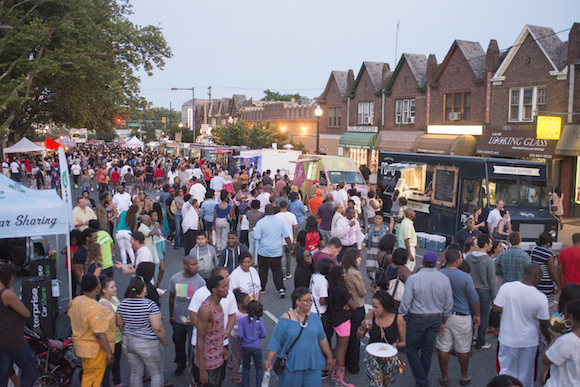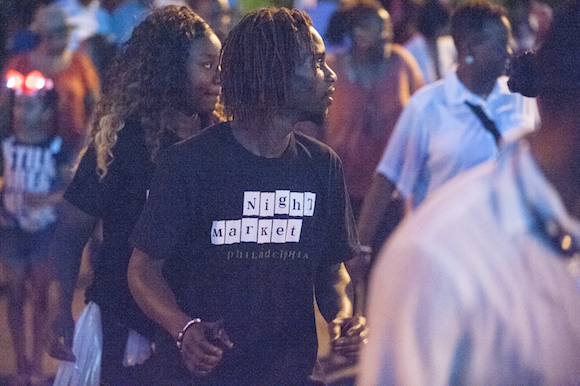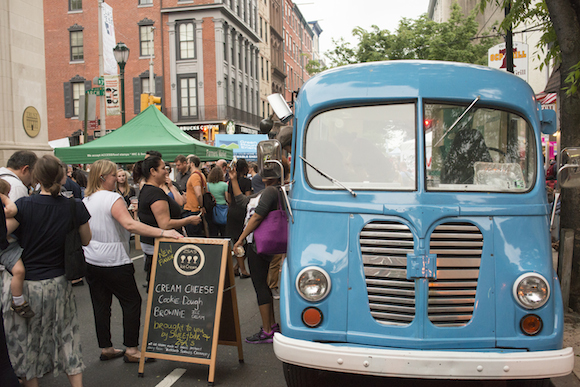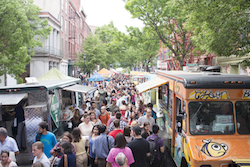Tonight, August 14, Lancaster Avenue between 35th and 39th streets will host Philadelphia's fifteenth Night Market — an event that's about a lot more than just tasty food. The area will be blocked off to cars, trolleys will be diverted and an expected 15,000 people will gather to enjoy vittles, drink and music in the waning summer evening.
Night Market is organized by The Food Trust, a local non-profit whose mission is to make healthy food available to everyone. The first Night Market was held in October 2010 along East Passyunk Avenue, a neighborhood that was in the process of establishing itself as a citywide dining destination (as of this writing, it has officially arrived). The goal was to highlight the local food scene, particularly restaurants and food vendors that were sourcing their food locally. A few hundred attendees were expected. Thousands turned out. All of the food was sold out in just a couple of hours and Night Market was here to stay.
Since that first event, over 200,000 attendees have eaten, drank and soaked in the atmosphere at open-air festivals throughout Philadelphia. Many of these gatherings have taken place in areas such as South Street, Old City, Chinatown and Northern Liberties that already see a large amount of foot traffic. The Lancaster Avenue Night Market is a little bit different.
Despite being home to numerous restaurants, art galleries, cafes and other small businesses, Lancaster Avenue and the surrounding neighborhoods are not often considered a destination for residents from the rest of the city. (Flying Kite spent three months On the Ground in Mantua; check out some of that coverage here.) Night Market is trying to change that.
“It's been our goal to highlight communities that have great things to offer but may be considered off-the-beaten-path,” says Diana Minkus, Night Market project manager at the Food Trust. Recent locations include West Oak Lane and Mt. Airy and Fairmount.
The Food Trust is not alone in their efforts. The People's Emergency Center (PEC), a West Philadelphia non-profit providing a range of social services in the area, is partnering to make sure this Night Market captures the distinct flavor of the neighborhood. There will be bands, drum lines, knit bombers, painters and sculptors, all drawn from the community. In addition, a number of popular West Philly food trucks will be joining vendors from around the city.
“It is such a big win for the neighborhood,” says James Wright, commercial corridor manager at PEC. “People get to come to the Lancaster Avenue corridor, probably see it for the first time – see what we have to offer.”
For Wright, what the neighborhood offers is an architecturally beautiful, easily accessible hub of small businesses and artists. Lancaster Avenue and the surrounding streets are lined with historic Victorian buildings, built in the late 19th and early 20th centuries, and towering trees found in few other places of the city. Close to the 34th Street and 40th Street stops on SEPTA's Market-Frankford Line and with the No. 10 trolley running down Lancaster Avenue itself, the neighborhood is easier to reach than newcomers may expect.
While most of the 15,000 expected Night Market visitors will be come to party, for local residents and advocates, the event is about a lot more than that — it's about getting Lancaster Avenue and surrounding neighborhoods on the map.
“It's helping the residents know that they are something special,” says Wright. “That they can draw people into their neighborhood and be celebrated in the same way that other communities are celebrated.”
Beyond building awareness, there are more tangible rewards for the area as well.
“Night Market has turned into an economic development effort,” explains Minkus. “Not only are we highlighting the local food scene, we're also supporting communities.”
An economic impact report prepared in 2012 by Econsult Solutions and expanded in 2013 found that the first twelve Night Markets accounted for $7.2 million in aggregate spending. The economic impact in the city was even wider, with $11.4 million of direct and indirect spending in Philadelphia supporting 123 jobs and generating about $134,000 in tax revenue for the city. The report also suggests that by attracting visitors from outside Philadelphia and directing spending to local businesses in lieu of national chains, Night Market is actually driving new spending and economic activity (not just shifting it from one neighborhood to another).
Most importantly for Mantua, the economic impact report found that Night Market will “likely lead to repeat visits, positioning corridors throughout the City to receive ongoing attention as destinations of choice for individuals and families as well as for merchants and vendors.” Surveys conducted by the Food Trust support these findings, with a high proportion of Night Market attendees planning to return to the event sites in the future.
BRANDON ALCORN is the project manager for Global Initiatives at the University of Pennsylvania and a freelance writer whose work has recently appeared in Nature,The New Republic and Slate. Follow him on Twitter at @b_alcorn.




